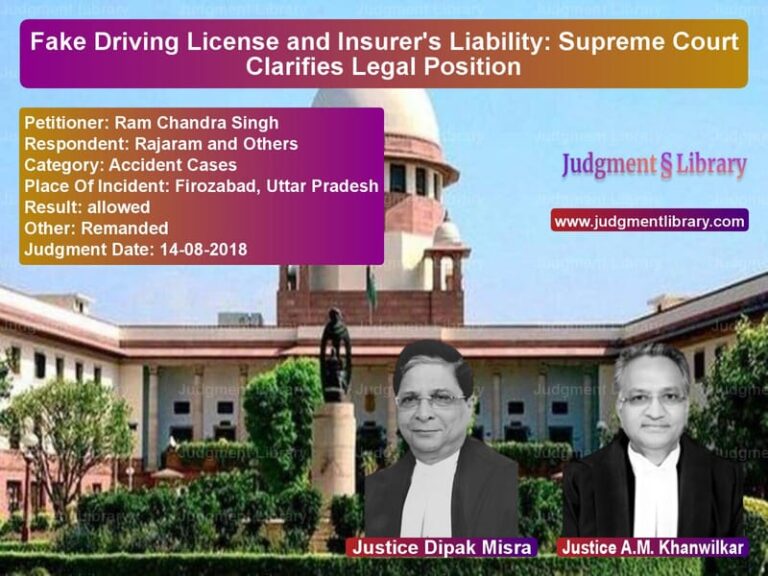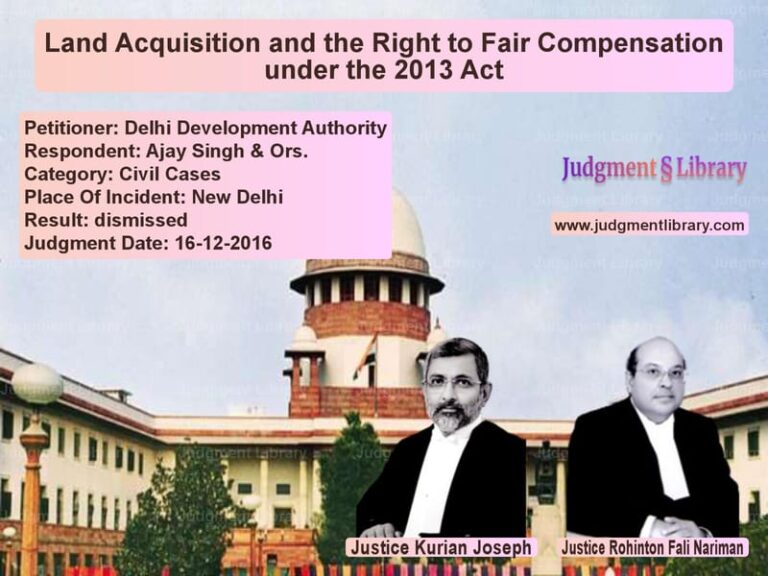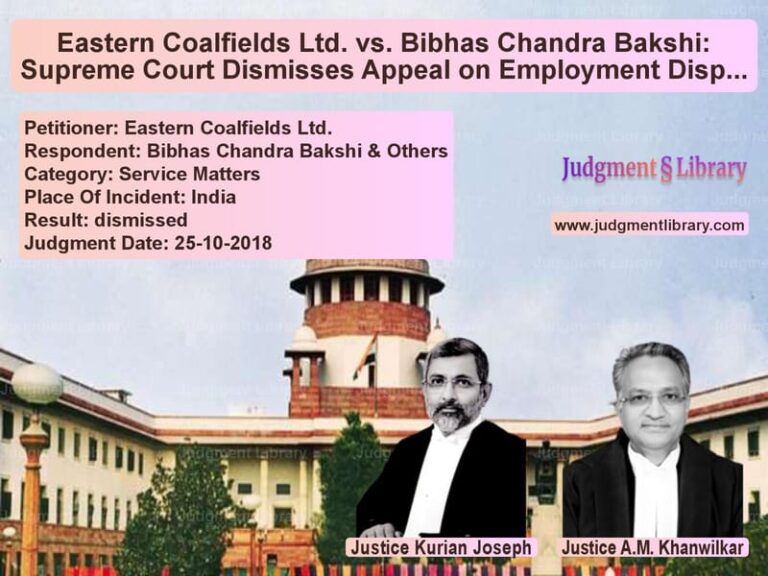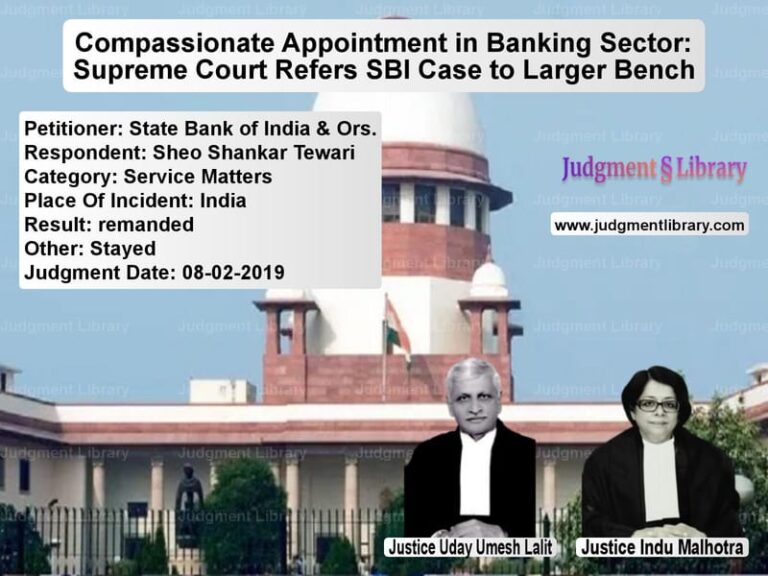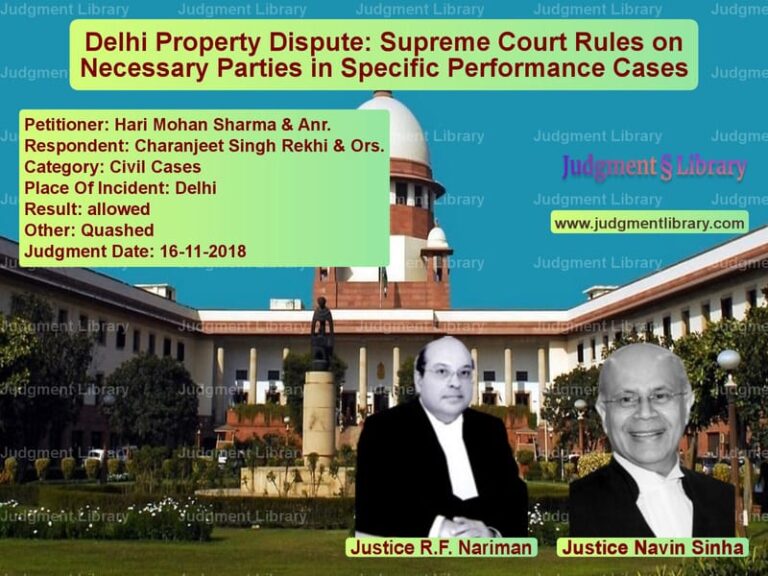Supreme Court Restores Criminal Proceedings in Protest Petition Case: Allahabad High Court’s Order Quashed
The Supreme Court recently ruled in Zunaid vs. State of U.P. & Others, reinstating criminal proceedings that were earlier set aside by the Allahabad High Court. The case involved a violent attack where the complainant and his family were allegedly assaulted with sharp weapons. The Court held that the High Court had erred in interfering with the Chief Judicial Magistrate’s (CJM) order that had accepted the Protest Petition and initiated criminal proceedings.
Background of the Case
The case originated on August 16, 2017, when Junaid Khan, the complainant, lodged an FIR against the accused, alleging that they attacked him and his family with weapons due to an old enmity. The police registered the FIR under Sections 147, 148, 149, 307, 323, 324, and 504 of the Indian Penal Code (IPC). However, after completing the investigation, the police submitted a Final Report (FR) on November 13, 2017, stating that no sufficient evidence was found against the accused.
Displeased with the police report, the complainant filed a Protest Petition in 2018 before the Chief Judicial Magistrate (CJM). The CJM rejected the Final Report on November 15, 2018, and treated the Protest Petition as a Complaint Case. Following an inquiry under Sections 200 and 202 CrPC, the CJM summoned the accused on January 11, 2022.
The accused then moved an application under Section 482 CrPC before the Allahabad High Court, challenging the CJM’s order. The High Court allowed the application, setting aside the CJM’s orders of November 15, 2018, and January 11, 2022, and directed a fresh hearing. The complainant, Zunaid, then approached the Supreme Court.
Key Legal Issues
- Whether the High Court erred in interfering with the CJM’s order accepting the Protest Petition.
- Whether the Protest Petition was legally treated as a Complaint Case.
- Whether the High Court’s intervention violated established principles of criminal procedure.
Arguments by the Petitioner (Zunaid Khan)
The complainant argued:
- The CJM had acted within its legal authority in rejecting the police’s Final Report and proceeding with the Protest Petition.
- The High Court wrongly interfered with the discretionary power of the CJM.
- The Protest Petition was supported by sworn testimonies of multiple witnesses under Sections 200 and 202 CrPC, justifying the summons to the accused.
- The accused were attempting to delay justice by repeatedly challenging valid judicial orders.
Arguments by the Respondents (Accused and State of U.P.)
The accused and the State contended:
- The police had conducted a full investigation and found no evidence to support the allegations.
- The CJM should not have treated the Protest Petition as a Complaint Case without further investigation.
- The High Court correctly ordered a fresh hearing to ensure a fair trial.
Key Observations by the Supreme Court
The Supreme Court reviewed the orders passed by both the CJM and the High Court and made the following key observations:
1. High Court’s Order Was Erroneous
“The findings recorded by the High Court are absolutely erroneous in view of the catena of decisions of this Court.”
The Court ruled that the High Court had exceeded its jurisdiction by setting aside the CJM’s valid judicial orders.
2. CJM’s Discretion to Accept Protest Petition
“The Magistrate has three options after receiving a police report under Section 173 CrPC: (1) accept the Final Report and drop proceedings, (2) take cognizance of the police report and issue process, or (3) take cognizance of the original complaint and proceed under Section 200 CrPC.”
The Court held that the CJM had rightfully exercised the third option, treating the Protest Petition as a Complaint Case.
3. Established Legal Precedents Support CJM’s Decision
“A Magistrate is not debarred from taking cognizance of a complaint merely because he had declined to take cognizance of the police report.”
The Supreme Court referred to previous judgments, including Rakesh vs. State of U.P. and Gopal Vijay Verma vs. Bhuneshwar Prasad Sinha, which held that a Magistrate has independent discretion to accept a Protest Petition even after a police report.
4. High Court Should Not Have Entertained the Accused’s Application
“The High Court committed a gross error in allowing the accused to amend their application four years after the CJM’s 2018 order.”
The Court ruled that the accused had delayed their challenge and should not have been allowed to revisit an old order.
Final Judgment
The Supreme Court ruled:
“The impugned orders passed by the High Court being highly erroneous, the same are quashed and set aside. The concerned CJM is directed to proceed with the Complaint Case in accordance with the law.”
The accused were ordered to respond to the summons and appear before the CJM within two weeks.
Conclusion
The Supreme Court’s judgment in Zunaid vs. State of U.P. & Others reinforces the discretionary power of Magistrates in criminal proceedings. The ruling ensures that Protest Petitions, when supported by evidence, cannot be arbitrarily dismissed. This judgment also discourages delayed challenges by accused persons attempting to evade prosecution through procedural loopholes. The decision upholds the right of complainants to seek justice when they believe that police investigations have been inadequate.
Petitioner Name: Zunaid.Respondent Name: State of U.P. & Others.Judgment By: Justice Bela M. Trivedi, Justice Dipankar Datta.Place Of Incident: Kannauj, Uttar Pradesh.Judgment Date: 29-08-2023.
Don’t miss out on the full details! Download the complete judgment in PDF format below and gain valuable insights instantly!
Download Judgment: zunaid-vs-state-of-u.p.-&-othe-supreme-court-of-india-judgment-dated-29-08-2023.pdf
Directly Download Judgment: Directly download this Judgment
See all petitions in Attempt to Murder Cases
See all petitions in Bail and Anticipatory Bail
See all petitions in Judgment by Bela M. Trivedi
See all petitions in Judgment by Dipankar Datta
See all petitions in allowed
See all petitions in Quashed
See all petitions in supreme court of India judgments August 2023
See all petitions in 2023 judgments
See all posts in Criminal Cases Category
See all allowed petitions in Criminal Cases Category
See all Dismissed petitions in Criminal Cases Category
See all partially allowed petitions in Criminal Cases Category


